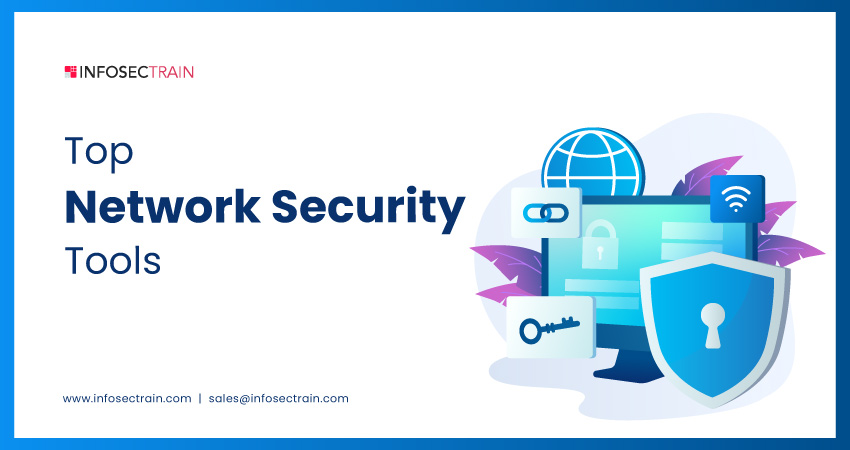Top Network Security Tools
A wide variety of individuals and organizations can use network security tools to protect networks from unauthorized access, cyber-attacks, data breaches, and other security threats. Network security tools are essential to ensure sensitive data’s confidentiality, integrity, and availability in today’s digital landscape. These tools help identify and prevent security breaches, detect and respond to cyber attacks, maintain regulatory compliance, and improve overall network performance and reliability. Without network security tools, organizations are vulnerable to various security threats.

In this article, you will find a comprehensive guide covering the top tools for network security and their respective features. First, we will provide you with a concise introduction to network security.
What is network security?
Network security safeguards IT networks against unauthorized access, misuse, modification, or disruption. It involves implementing various technologies and processes, such as encryption, access controls, authentication protocols, and firewalls, to secure the availability, confidentiality, and integrity of data and services transmitted over a network. These measures help to prevent attacks and detect and respond to potential security breaches.
Top network security tools
There are many network security tools available, each with its unique set of features. Some of the common network security tools are:
1.Snort: It is a free and open-source intrusion detection and prevention system that can detect and block network attacks. It can monitor network traffic in real-time and detect suspicious activity based on predefined rules.
Features:
Here are some key features of Snort:
- Real-time traffic analysis and packet logging
- Protocol analysis, content searching, and pattern matching
- Flexible rule-based language for customizing detection and response
- Multi-platform support and integration with other security tools
2. Wireshark: It is a widely used open-source network protocol analyzer that enables users to record and analyze network traffic in real-time. It is a powerful tool that offers detailed information on the data transmitted over a network, helping users troubleshoot network issues and identify security threats.
Features:
Here are some key features of Wireshark:
- Captures and displays packets in real-time
- Supports various network protocols and file formats
- Provides detailed packet analysis and filtering capabilities
3. Nmap: It is a powerful network mapping tool that scans networks and provides information about open ports, services, and vulnerabilities.
Features:
Here are some key features of Nmap:
- Detect hosts and services on a network
- Perform port scanning, OS detection, and vulnerability scanning
- Supports a variety of scanning techniques and output formats
- Integration with other security tools and platforms
- Cross-platform compatibility
4. Metasploit: It is a framework that allows users to test the security of networks and applications by exploiting known vulnerabilities.
Features:
Here are some key features of Metasploit:
- Automated vulnerability scanning
- Post-exploitation actions and lateral movement
- Remote control of compromised systems
- Integration with other security tools
- Comprehensive exploit database
5. Nessus: It is a popular network security tool used for vulnerability scanning, detection, and assessment. It can identify security flaws in networks and provide detailed reports on how to fix them.
Features:
Here are some key features of Nessus:
- Supports multiple operating systems and platforms
- Perform comprehensive security checks on network devices and systems
- Provide detailed reports on vulnerabilities found and potential security risks
- Supports compliance checks with various security standards and regulations
6. OpenVAS: It is a powerful vulnerability scanner that can detect and report security issues in networks and systems.
Features:
Here are some key features of OpenVAS:
- Scans networks for security flaws and vulnerabilities
- Analyze and identify potential security concerns
- Detect common network vulnerabilities
- Provides detailed reports on vulnerabilities and suggests remediation advice
- Integrated with other security frameworks and tools
7. Firewall: It monitors and manages incoming and outgoing network traffic based on predefined security rules. It acts as a barrier between a computer network and the internet, preventing unauthorized access and protecting the network from cyber-attacks.
Features:
Here are some key features of the Firewall:
- Filters incoming and outgoing traffic based on pre-set rules
- Block traffic from specific IP addresses or applications
- Identify and prevent unauthorized access to the network
- Provide logging and reporting capabilities
8. Proxy server: It is a server that serves as an intermediary between clients and servers, providing additional security by filtering and blocking unauthorized access.
Features:
Here are some key features of a Proxy server:
- Hides client IP address
- Filter and block access to certain websites
- Provide encryption and enhance privacy
- Monitor and log user activity
9. VPN (Virtual Private Network): It encrypts and secures network traffic between two or more devices, providing a secure connection over the internet.
Features:
Here are some key features of VPN:
- Encrypts traffic
- Hides IP address and location
- Authenticates users and devices
- Provides secure remote access
- Maintains privacy and confidentiality of user data
You can also refer to related blogs:
- Types Of Network Security Attacks
- Cloud Security Vs. Network Security
- All About Network Security and Its Essentials
- What Is A Network Security Administrator?
Network security with InfosecTrain
As organizations increasingly rely on technology to conduct business, the need for skilled network security professionals grows. You should understand network security and network security tools to become a successful network security professional.
If you want to learn network security tools to protect your personal and professional networks from cyber threats that can compromise your privacy and data, enroll in Infosectrain‘s Network Security training course. This course will give you a foundational grasp of networks and their numerous components. The course covers various concepts and tools used to secure networks. Throughout this training course, you will learn how to identify and mitigate network security threats and attacks affecting network security systems.







 1800-843-7890 (India)
1800-843-7890 (India)